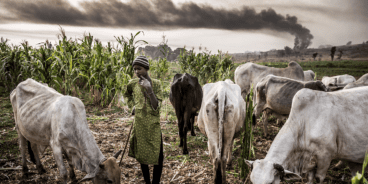Atrocity Alert No. 45: Syria and the Lake Chad Basin
Atrocity Alert is a weekly publication by the Global Centre for the Responsibility to Protect highlighting and updating situations where populations are at risk of, or are enduring, mass atrocity crimes.
Syria
On 28 February Russia and China vetoed yet another draft resolution at the UN Security Council (UNSC) on Syria. The draft resolution put forward by France, the United Kingdom and the United States, would have ensured accountability for the use of chemical weapons in Syria. The resolution received nine supporting votes but was opposed by Russia, China and Bolivia. Egypt, Ethiopia and Kazakhstan abstained.
The draft resolution would have imposed sanctions under Chapter VII of the UN Charter on Syrian government officials and entities linked to chemical weapons attacks that have taken place in Syria since 2013. Additionally, it would have placed an embargo on arms sales and chemicals intended to be used as weapons, and established a sanctions committee to monitor the implementation of these measures. The draft resolution was intended as a follow up to Resolution 2118, which required the destruction of Syria’s chemical weapons stockpiles and committed to Chapter VII measures in the event of non-compliance.
The Organisation for the Prohibition of Chemical Weapons-UN Joint Investigative Mechanism (OPCW-JIM), established by the UNSC in August 2015, has determined that the Syrian government has used toxic chemicals as weapons on three separate occasions – in Talmenes on 21 April 2014, Qmenas on 16 March 2015, and Sarmin on 16 March 2015. The OPCW-JIM also determined that the so-called Islamic State of Iraq and the Levant (ISIL) used mustard gas in Marea on 21 August 2015.
There is compelling evidence of numerous other chemical weapons attacks in Syria since 2013 which have not yet been confirmed by the OPCW-JIM, including a recent Human Rights Watch report that details eight chlorine attacks by the Syrian government on opposition-held neighborhoods of Aleppo during November and December 2016. The four attacks identified in the OPCW-JIM report were independently verified by scientific evidence, in addition to eyewitness testimony.
The use of chemical weapons in Syria is a clear violation of International Humanitarian Law and constitutes a war crime. Russia and China’s vetoes ensure impunity not only for Syrian government forces, but for ISIL as well.
While the UNSC remains deadlocked by internal political divisions, the international community must invest in alternative avenues to pursue accountability. All UN member states should cooperate fully with the Impartial, Independent, International Investigative Mechanism for Syria established by the UN General Assembly last December, and facilitate its work through the provision of voluntary funding and technical assistance.
Lake Chad Basin
UN Security Council members departed today for a five-day mission to the Lake Chad Basin. Council members will briefly visit Cameroon, Chad, Niger and Nigeria. An estimated 11 million people in the Lake Chad region are currently in need of humanitarian assistance.
Countries in the Lake Chad Basin have been devastated by a seven-year conflict with the armed extremist group Boko Haram, which has claimed more than 20,000 lives, displaced 2.3 million people, destroyed infrastructure and disrupted farming and trade. Boko Haram has committed atrocities, including systematic attacks against civilians and the enslavement of captured women and girls. While Boko Haram continues to pose a threat, it no longer controls significant territory, focusing instead on terrorist attacks targeting vulnerable civilians.
Emergency humanitarian assistance is essential to save lives within the Lake Chad Basin region. However, long-term engagement is also necessary to facilitate the safe return of displaced populations, help affected communities rebuild, and stop the cycle of violence and insecurity. Nigeria, which continues to be the epicenter of the crisis, also requires ongoing security sector reform and political initiatives that address the root causes of conflict, corruption and marginalization that armed extremists like Boko Haram seek to exploit.
Read Next
Related Publications

Atrocity Alert No. 445: Sudan, Syria and Eritrea

Atrocity Alert No. 444: Nigeria, Haiti and South Sudan
